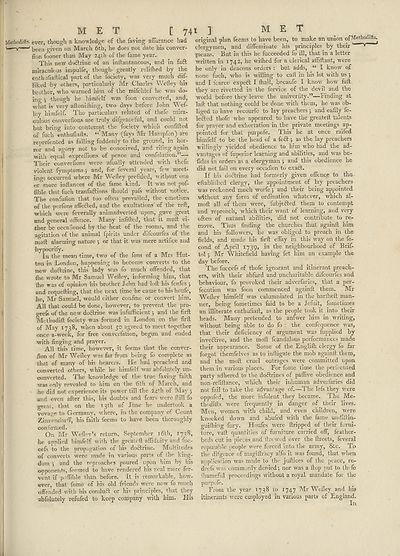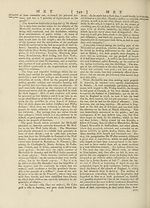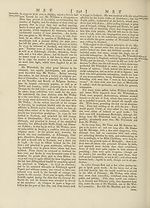Encyclopaedia Britannica, or, a Dictionary of arts, sciences, and miscellaneous literature : enlarged and improved. Illustrated with nearly six hundred engravings > Volume 13, MAT-MIC
(787) Page 741
Download files
Complete book:
Individual page:
Thumbnail gallery: Grid view | List view

MET [74
ItfethodHH ever, though a knowledge of the faving afiurance had
been given on March 6th, he does not date his conver-
fion fooner than May 24th of the fame year.
This new do&rine of an inftantaneous, and in faft
miraculous impulfe, though greatly relithed by the
enthufiaftical part of the iociety, was very much dif-
liked by others, particularly Mr Charles Wefley his
brother, who warned him of the mifchief he was do¬
ing •, though he himielf was foon converted, and,
what is very aftonithing, two days before John Wef¬
ley himfelf. The particulars related of thefe mira¬
culous converfions are truly difgraceful, and could not
but bring into contempt the fociety which confided
of fuch cnthufiafts. “ Many (fays Mr Hampfon) are
reprefented as falling fuddenly to the ground, in hor¬
ror and agony not to be conceived, and riling again
with equal expreflions of peace and confolation.”—
Their converfions were ufually attended with thefe
violent fymptoms 5 and, for feveral years, few meet¬
ings occurred where Mr Wefley prefided, w ithout one
or°more inftances of the fame kind. It was not pof-
fible that fuch tranfaftions fhould pals without notice.
The confufion that too often prevailed, the emotions
of the perfons affecled, and the exultations' of the reft,
which were feverally animadverted upon, gave great
and general offence. Many infifted, that it mult ei¬
ther be occaiioned by the heat of the rooms, and the
agitation of the animal fpirits under dlfcourfes of the
xuoft alarming nature 5 or that it was mere artifice and
hypocrify.
In the mean time, tvro of the fons of a Mrs Hut¬
ton in London, happening to become converts to the
new doftrine, this lady was fo much offended, that
the wrote to Mr Samuel Wefley, informing him, that
ihe was of opinion his brother John had loft his fenfes ;
and requefting, that the next time he came to his houfe,
he, Mr Samuel, would either confine or convert him.
All that could be done, however, to prevent the pro-
grefe of the new do£trine was infufficient and the firft
Mcthodift fociety was formed in Imndon on the firft
of May 1738, when about 50 agreed to meet together
once a-week, for free eonverfation, begun and ended
with finging and prayer.
All this time, however, it feems that the conver-
fion of Mr Wefley was far from being fo complete as
that of many of his hearers. He had preached and
converted others, while he himfelf was abfolutely un¬
converted. The knowledge of the true faving faith
was only revealed to him on the 6th of March, and
he did not experience its power till the a-jHi of May 5
and even after this, his doubts and fears were ftill fo
great, that on the T^th of June he undertook a
voyage to Germany, where, in the company of Count
Zinzendorff, his faith feems to have been thoroughly
confirmed.
On Mr Weflev’s return, September 16th, 1738,
he applied himfeif with the greateft afliduity and fuc-
cefs to the propagation of his doctrine. Multitudes
of converts were made in various parts of the king¬
dom *, and the reproaches poured upon him by his
opponents, feemed to have rendered his zeal more fer¬
vent if p flible than before. It is remarkable, how¬
ever, that fome of his old friends were now fo much
offended with his conduct or his principles, that they
abfolutely refufed to keep company with him. His
1 ] MET
original plan feems to have been, to make an union ofMethodifts.^
clergymen, and diffeminate his principles by their *
means. But in this he fucceeded fo ill, that in a letter
written in 1742, he withed for a clerical afliftant, were
he only in deacons orders : but adds, u I know of
none fuch, who is willing to caft in his lot with us 5
and I learce expect I (hall, becaufe I know how fail
they are nvetted in the fervice of the devil and the
world before they leave the univerfity.”—Finding at
laft that nothing could be done with them, he was ob¬
liged to have recourfe to lay preachers ; and eafily fe-
le£ted thofe who appeared to have the greateft talents
for prayer and exhortation in the private meetings ap¬
pointed for that pur pole. This he at once railed
himfelf to be the head of a fe£t ; as the lay preachers
willingly yielded obedience to him who had the ad¬
vantages of fuperior learning and abilities, and was be¬
tides in orders as a clergyman } and this obedience he
did not fail on every ocealion to exaft.
If his doctrine had formerly given offence to tha.
eltabliftied clergy, the appointment of lay preachers
was reckoned much worfe ; and their being appointed
without any form of ordination whatever, which al-
moft all of them were, fubjefted them to contempt
and reproach, which their want of learning, and very
often of natural abilities, did not contribute to re¬
move. Thus finding the churches Ihut againft him
and his followers, he was obliged to preach in the
fields, and made his firft effay in this way on the fe¬
cund of April 1739, in the neighbourhood of Brif-
tol j Mr Whitefield having fet him an example the
day before.
The fuccefs of thofe ignorant and itinerant preach¬
ers, with their abfurd and uncharitable difcourfes and
behaviour, fo provoked their adverfaries, that a per-
fecution was foon commenced againft them. Mr
Wefley himfelf was calumniated in the harlheft man¬
ner, being fometimes faid to be a Jefuit, fometimes
an illiterate enthufiaft, as the people took it into their
heads. Many pretended to anfwer him in writing,
Avithout being able to do fo the confequence Avas,
that their deficiency of argument Avas fupplied by
inveftiA^e, and the moft fcandalous performances made
their appearance. Some of the Englilh clergy fo far
forgot themfelves as to inftigate the mob againft them,
and the moft cruel outrages Avere committed upon
them in various places. For fome time the perfecuted
party adhered to the doftrines of paflive obedience and
non-refiftance, Avhich their inhuman adverfaries did
not fail to take the advantage of.—The lefs they vrere
oppofed, the more infolent they became. The Me-
thodifts Avere frequently in danger of their lives.
Men, Avomen with child, and even children, Avere
knocked down and abufed with the fame undiftin-
guififing fury. Houfes Avere ftripped of their furni¬
ture, vaft quantities of furniture carried off, feather¬
beds cut in pieces and ftrtwed over the ftreets, feveral
reputable people were forced into the army, &c. To
the difg. ace of magiftracy alfo it Avas found, that Avhen
anplicaUon Avas made to the juftices of the peace, re-
drefs Avas commonly denied-, nor was a flop put to th fe
(hameful proceedings without a royal mandate for the
purpofe.
From the year 1738 to 1747 Mr Wefley and his
itinerants Avere employed in various parts of England.
In
ItfethodHH ever, though a knowledge of the faving afiurance had
been given on March 6th, he does not date his conver-
fion fooner than May 24th of the fame year.
This new do&rine of an inftantaneous, and in faft
miraculous impulfe, though greatly relithed by the
enthufiaftical part of the iociety, was very much dif-
liked by others, particularly Mr Charles Wefley his
brother, who warned him of the mifchief he was do¬
ing •, though he himielf was foon converted, and,
what is very aftonithing, two days before John Wef¬
ley himfelf. The particulars related of thefe mira¬
culous converfions are truly difgraceful, and could not
but bring into contempt the fociety which confided
of fuch cnthufiafts. “ Many (fays Mr Hampfon) are
reprefented as falling fuddenly to the ground, in hor¬
ror and agony not to be conceived, and riling again
with equal expreflions of peace and confolation.”—
Their converfions were ufually attended with thefe
violent fymptoms 5 and, for feveral years, few meet¬
ings occurred where Mr Wefley prefided, w ithout one
or°more inftances of the fame kind. It was not pof-
fible that fuch tranfaftions fhould pals without notice.
The confufion that too often prevailed, the emotions
of the perfons affecled, and the exultations' of the reft,
which were feverally animadverted upon, gave great
and general offence. Many infifted, that it mult ei¬
ther be occaiioned by the heat of the rooms, and the
agitation of the animal fpirits under dlfcourfes of the
xuoft alarming nature 5 or that it was mere artifice and
hypocrify.
In the mean time, tvro of the fons of a Mrs Hut¬
ton in London, happening to become converts to the
new doftrine, this lady was fo much offended, that
the wrote to Mr Samuel Wefley, informing him, that
ihe was of opinion his brother John had loft his fenfes ;
and requefting, that the next time he came to his houfe,
he, Mr Samuel, would either confine or convert him.
All that could be done, however, to prevent the pro-
grefe of the new do£trine was infufficient and the firft
Mcthodift fociety was formed in Imndon on the firft
of May 1738, when about 50 agreed to meet together
once a-week, for free eonverfation, begun and ended
with finging and prayer.
All this time, however, it feems that the conver-
fion of Mr Wefley was far from being fo complete as
that of many of his hearers. He had preached and
converted others, while he himfelf was abfolutely un¬
converted. The knowledge of the true faving faith
was only revealed to him on the 6th of March, and
he did not experience its power till the a-jHi of May 5
and even after this, his doubts and fears were ftill fo
great, that on the T^th of June he undertook a
voyage to Germany, where, in the company of Count
Zinzendorff, his faith feems to have been thoroughly
confirmed.
On Mr Weflev’s return, September 16th, 1738,
he applied himfeif with the greateft afliduity and fuc-
cefs to the propagation of his doctrine. Multitudes
of converts were made in various parts of the king¬
dom *, and the reproaches poured upon him by his
opponents, feemed to have rendered his zeal more fer¬
vent if p flible than before. It is remarkable, how¬
ever, that fome of his old friends were now fo much
offended with his conduct or his principles, that they
abfolutely refufed to keep company with him. His
1 ] MET
original plan feems to have been, to make an union ofMethodifts.^
clergymen, and diffeminate his principles by their *
means. But in this he fucceeded fo ill, that in a letter
written in 1742, he withed for a clerical afliftant, were
he only in deacons orders : but adds, u I know of
none fuch, who is willing to caft in his lot with us 5
and I learce expect I (hall, becaufe I know how fail
they are nvetted in the fervice of the devil and the
world before they leave the univerfity.”—Finding at
laft that nothing could be done with them, he was ob¬
liged to have recourfe to lay preachers ; and eafily fe-
le£ted thofe who appeared to have the greateft talents
for prayer and exhortation in the private meetings ap¬
pointed for that pur pole. This he at once railed
himfelf to be the head of a fe£t ; as the lay preachers
willingly yielded obedience to him who had the ad¬
vantages of fuperior learning and abilities, and was be¬
tides in orders as a clergyman } and this obedience he
did not fail on every ocealion to exaft.
If his doctrine had formerly given offence to tha.
eltabliftied clergy, the appointment of lay preachers
was reckoned much worfe ; and their being appointed
without any form of ordination whatever, which al-
moft all of them were, fubjefted them to contempt
and reproach, which their want of learning, and very
often of natural abilities, did not contribute to re¬
move. Thus finding the churches Ihut againft him
and his followers, he was obliged to preach in the
fields, and made his firft effay in this way on the fe¬
cund of April 1739, in the neighbourhood of Brif-
tol j Mr Whitefield having fet him an example the
day before.
The fuccefs of thofe ignorant and itinerant preach¬
ers, with their abfurd and uncharitable difcourfes and
behaviour, fo provoked their adverfaries, that a per-
fecution was foon commenced againft them. Mr
Wefley himfelf was calumniated in the harlheft man¬
ner, being fometimes faid to be a Jefuit, fometimes
an illiterate enthufiaft, as the people took it into their
heads. Many pretended to anfwer him in writing,
Avithout being able to do fo the confequence Avas,
that their deficiency of argument Avas fupplied by
inveftiA^e, and the moft fcandalous performances made
their appearance. Some of the Englilh clergy fo far
forgot themfelves as to inftigate the mob againft them,
and the moft cruel outrages Avere committed upon
them in various places. For fome time the perfecuted
party adhered to the doftrines of paflive obedience and
non-refiftance, Avhich their inhuman adverfaries did
not fail to take the advantage of.—The lefs they vrere
oppofed, the more infolent they became. The Me-
thodifts Avere frequently in danger of their lives.
Men, Avomen with child, and even children, Avere
knocked down and abufed with the fame undiftin-
guififing fury. Houfes Avere ftripped of their furni¬
ture, vaft quantities of furniture carried off, feather¬
beds cut in pieces and ftrtwed over the ftreets, feveral
reputable people were forced into the army, &c. To
the difg. ace of magiftracy alfo it Avas found, that Avhen
anplicaUon Avas made to the juftices of the peace, re-
drefs Avas commonly denied-, nor was a flop put to th fe
(hameful proceedings without a royal mandate for the
purpofe.
From the year 1738 to 1747 Mr Wefley and his
itinerants Avere employed in various parts of England.
In
Set display mode to:
![]() Universal Viewer |
Universal Viewer | ![]() Mirador |
Large image | Transcription
Mirador |
Large image | Transcription
Images and transcriptions on this page, including medium image downloads, may be used under the Creative Commons Attribution 4.0 International Licence unless otherwise stated. ![]()
| Permanent URL | https://digital.nls.uk/192694281 |
|---|
| Attribution and copyright: |
|
|---|
| Description | Ten editions of 'Encyclopaedia Britannica', issued from 1768-1903, in 231 volumes. Originally issued in 100 weekly parts (3 volumes) between 1768 and 1771 by publishers: Colin Macfarquhar and Andrew Bell (Edinburgh); editor: William Smellie: engraver: Andrew Bell. Expanded editions in the 19th century featured more volumes and contributions from leading experts in their fields. Managed and published in Edinburgh up to the 9th edition (25 volumes, from 1875-1889); the 10th edition (1902-1903) re-issued the 9th edition, with 11 supplementary volumes. |
|---|---|
| Additional NLS resources: |
|

